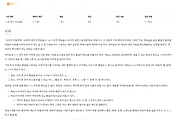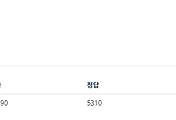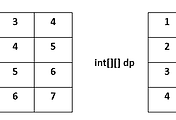🔗 문제


👨🏻💻 풀이 및 코드
문제 유형 및 난이도 : 브루트포스, 백트랙킹 / G4
나한텐 좀 어려웠다. 처음엔 단순하게 한 개의 팀이 경기를 하는 횟수가 5여야 하고, 진 횟수와 이긴 횟수를 비교하고, 비긴 횟수가 짝수로 떨어지면 될 거라고 생각했는데 다른 사람들 해설을 참고하니 아예 접근 방식이 틀리고 완탐 + 백트랙킹으로 푸는 문제였다.
일단 조건을 찬찬히 살펴보자.
총 6개의 팀이 있다.
A, B, C, D, E, F
한 번 경기를 치룬 팀과는 경기를 다시 치루지 않는다.
이 때 치르게 되는 총 경기의 횟수는 얼마일까?
A - B, C, D, E, F
B - C, D, E, F
C - D, E, F
D - E, F
E - F
이렇게 총 15번 이다. (5 + 4 + 3 + 2 + 1)
이 경우를 모두 반복문을 통해 탐색할 예정이다. 그리고, 한 개의 승부를 살펴보자. 한 개의 승부에선 3개의 결과가 나온다.
A 와 B 가 경기를 한다.
① A 승 / B 패
② A 무 / B 무
③ A 패 / B 승
총 15번의 경기를 치르면서 3개의 상황을 모두 체크한다.
만약, 입력으로 주어진 승패 점수 표가 이에 해당하지 않는다면 불가능한 결과로 판단한다.
이제 코드로 설계해보자.
static final int TEAM_NUMBER = 6; // 총 6개의 팀이 참가한다.
int matchCount = 0; // 총 경기의 수는 15이다. (5 + 4 + 3 + 2 + 1)
for(int i=1; i<TEAM_NUMBER; i++) {
matchCount += i;
}
// 경기의 A, B, C, D, E, F 를 각각 0, 1, 2, 3, 4, 5 로 바꿔서 match 에 담는다.
// match[0] = new int[] {0, 0, 0, 0, 0, 1, 1, 1, 1, 2, 2, 2, 3, 3, 4};
// match[1] = new int[] {1, 2, 3, 4, 5, 2, 3, 4, 5, 3, 4, 5, 4, 5, 5};
// ex) matchCount[0][0] : 0, matchCount[0][1] : 1 -> 0번째엔 A와 B 가 경기한다.
int[][] match = new int[matchCount][2];
int idx=0;
for(int i=0; i<TEAM_NUMBER; i++) {
for(int j=i+1; j<TEAM_NUMBER; j++) {
match[idx][0] = i;
match[idx++][1] = j;
}
}
이제 경기까진 들어왔고 한 경기에 3가지 상황이 발생한다.
score 에는 입력으로 주어진 승무패의 횟수가 들어있는데, 0보다 큰 경우만 가능하다.
만약 15번의 경기까지 모두 무사히 치뤘다면 그 경우는 가능한 경우이다.
static boolean play(int turn) {
// 무사히 15개의 경기를 치뤘다면 가능한 결과
if(turn == 15) {
return true;
}
// turn번째 경기
// ex) team1 = A, team2 = B
int team1 = match[turn][0];
int team2 = match[turn][1];
// 입력으로 주어진 결과가 0보다 크다면
if(score[team1][0] > 0 && score[team2][2] > 0) {
score[team1][0]--;
score[team2][2]--;
if(play(turn+1)) return true;
score[team1][0]++;
score[team2][2]++;
}
// A 무 / B 무
if(score[team1][1] > 0 && score[team2][1] > 0) {
score[team1][1]--;
score[team2][1]--;
if(play(turn+1)) return true;
score[team1][1]++;
score[team2][1]++;
}
// A 패 / B 승
if(score[team1][2] > 0 && score[team2][0] > 0) {
score[team1][2]--;
score[team2][0]--;
if(play(turn+1)) return true;
score[team1][2]++;
score[team2][0]++;
}
return false;
}
해당 매커니즘의 시간 복잡도는 O(3^15) 이다. (1번의 경기당 3개의 결과가 있는데, 총 15개의 경기를 치르므로)
위 코드는 총 치뤄야 하는 경기의 갯수를 체크하진 못한다. 따라서, 각 팀이 치르는 경기의 수가 5가 아니면 불가능한 결과라는 조건을 추가해야 한다.
나머진 전체 코드를 보면 이해가 될 것 같다.
전체 코드
import java.io.*;
import java.util.*;
public class Main_bj_6987_월드컵 {
static int[][] match;
static final int TEAM_NUMBER = 6;
static int[][] score;
public static void main(String[] args) throws Exception {
BufferedReader br = new BufferedReader(new InputStreamReader(System.in));
StringBuilder sb = new StringBuilder();
StringTokenizer st;
int matchCount = 0; // 총 경기 횟수
for(int i=1; i<TEAM_NUMBER; i++) {
matchCount += i;
}
match = new int[matchCount][2]; // i번째 경기 때 경기할 팀의 번호 ex)match[0][0] : A, match[0][1] : B => 0번째에 A와 B가 경기를 함.
int idx=0;
for(int i=0; i<TEAM_NUMBER; i++) {
for(int j=i+1; j<TEAM_NUMBER; j++) {
match[idx][0] = i;
match[idx++][1] = j;
}
}
score = new int[TEAM_NUMBER][3]; // [0]: 이긴 횟수, [1]: 비긴 횟수: [2]: 진 횟수
for(int i=0; i<4; i++) {
st = new StringTokenizer(br.readLine(), " ");
int res = 1;
for(int a=0; a<TEAM_NUMBER; a++) {
int total=0;
int win = score[a][0] = Integer.parseInt(st.nextToken());
int draw = score[a][1] = Integer.parseInt(st.nextToken());
int lose = score[a][2] = Integer.parseInt(st.nextToken());
total += win + draw + lose;
if(total != 5) {
res = 0;
}
}
if(res==1 && !play(0)) {
res = 0;
}
sb.append(res).append(" ");
}
System.out.println(sb.toString());
br.close();
}
static boolean play(int turn) {
if(turn == 15) {
return true;
}
// turn번째 경기
// A 승 / B 패
int team1 = match[turn][0];
int team2 = match[turn][1];
if(score[team1][0] > 0 && score[team2][2] > 0) {
score[team1][0]--;
score[team2][2]--;
if(play(turn+1)) return true;
score[team1][0]++;
score[team2][2]++;
}
// A 무 / B 무
if(score[team1][1] > 0 && score[team2][1] > 0) {
score[team1][1]--;
score[team2][1]--;
if(play(turn+1)) return true;
score[team1][1]++;
score[team2][1]++;
}
// A 패 / B 승
if(score[team1][2] > 0 && score[team2][0] > 0) {
score[team1][2]--;
score[team2][0]--;
if(play(turn+1)) return true;
score[team1][2]++;
score[team2][0]++;
}
return false;
}
}
Reference
'알고리즘 풀이 > 백준' 카테고리의 다른 글
| [BOJ] 15898. 피아의 아틀리에 ~신비한 대회의 연금술사~ - JAVA (0) | 2023.06.30 |
|---|---|
| [BOJ] 17825. 주사위 윷놀이 - JAVA (0) | 2023.05.13 |
| [BOJ] 23290. 마법사 상어와 복제 - JAVA (0) | 2023.04.24 |
| [BOJ] 11660. 구간 합 구하기 5 - JAVA (0) | 2023.03.16 |
| [BOJ] 10986. 나머지 합 - JAVA (0) | 2023.03.15 |


